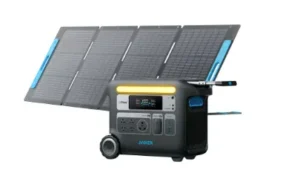When considering a generator, it’s crucial to weigh the advantages of solar generators against traditional ones. Solar generators, powered by renewable energy, are becoming increasingly popular for their numerous benefits. This article explores why a solar generator might be a better choice, focusing on environmental impact, cost efficiency, reliability, and maintenance requirements. Understanding these factors will help you make an informed decision about which type of generator best suits your needs. Whether you’re preparing for emergencies, planning outdoor adventures, or looking for a sustainable energy source, solar generators offer compelling advantages worth considering.
Environmental Impact and Sustainability
Solar generators have a significantly lower environmental impact compared to traditional generators. Traditional generators often rely on fossil fuels, contributing to greenhouse gas emissions and air pollution. In contrast, solar generators harness energy from the sun, a clean and renewable source, which helps reduce carbon footprints and supports environmental sustainability.
Using solar power means:
– No emissions: Solar generators produce zero emissions during operation.
– Renewable energy: Solar energy is abundant and renewable, unlike finite fossil fuels.
– Reduced dependency on fossil fuels: Shifting to solar energy decreases reliance on oil, coal, and natural gas.
In addition to reducing harmful emissions, solar generators also minimize noise pollution. Traditional generators can be loud and disruptive, especially in residential areas. Solar generators, however, operate quietly, making them ideal for use in various settings without disturbing the peace.
Choosing a solar generator aligns with global efforts to combat climate change. Governments and organizations worldwide are promoting the use of renewable energy sources to reduce environmental impact. By opting for a solar generator, you contribute to a more sustainable future.
For those interested in making a positive environmental impact, the best solar generator options on the market offer an eco-friendly alternative to traditional generators. Solar generators not only provide a reliable power source but also support a greener planet, making them a smart choice for environmentally conscious individuals and businesses.
Cost Efficiency and Savings
Solar generators offer long-term cost savings compared to traditional generators. While the initial investment in a solar generator may be higher, the ongoing operating costs are significantly lower. Traditional generators require continuous fuel purchases, which can be expensive over time. In contrast, solar generators use sunlight, which is free and abundant.
Consider the following cost-saving factors:
– No fuel costs: Solar generators eliminate the need for gasoline or diesel.
– Low maintenance costs: Solar generators have fewer moving parts, resulting in lower maintenance expenses.
– Incentives and rebates: Many governments offer incentives and rebates for solar energy installations, reducing the overall cost.
Over time, the savings from reduced fuel and maintenance costs can offset the initial investment in a solar generator. Additionally, solar generators can increase property value, as more homebuyers seek energy-efficient and sustainable homes.
Solar generators also provide cost stability. Fuel prices are subject to fluctuations, which can impact the cost of operating traditional generators. Solar energy, however, remains consistent and unaffected by market changes, offering predictable energy costs.
Businesses can benefit significantly from switching to solar generators. Lower operational costs translate to increased profitability. For homeowners, the savings can be substantial, especially during prolonged power outages or in off-grid locations.
Investing in a solar generator is a financially wise decision. By choosing solar over traditional generators, you can enjoy the benefits of renewable energy while saving money in the long run. The best solar generator options available today offer a cost-effective and reliable power solution for various needs.

Reliability and Performance
Solar generators are known for their reliability and performance. Unlike traditional generators that rely on fuel availability, solar generators use sunlight, which is widely accessible. This makes them a dependable power source, especially in areas with frequent power outages or limited fuel supply.
Key reliability features of solar generators include:
– Consistent power supply: Solar generators can store energy in batteries, ensuring a continuous power supply even when the sun isn’t shining.
– Minimal maintenance: With fewer moving parts, solar generators are less prone to mechanical failures.
– Durability: Solar panels and batteries are designed to withstand various weather conditions, ensuring long-term performance.
Traditional generators, on the other hand, can be affected by fuel shortages and mechanical issues. They require regular maintenance, such as oil changes and part replacements, to remain operational. Solar generators eliminate these concerns, offering a hassle-free power solution.
Performance-wise, solar generators are versatile and can power a wide range of devices. They are suitable for both small and large-scale applications, from charging phones and laptops to running household appliances and essential medical equipment. Modern solar generators come with advanced features like multiple charging ports, inverters, and smart technology, enhancing their usability and efficiency.
For outdoor enthusiasts and travelers, solar generators provide a reliable power source without the need for fuel storage or transportation. They are lightweight and portable, making them ideal for camping, RV trips, and remote work sites.
What Are the Maintenance Requirements?
Maintenance is a crucial consideration when choosing between a solar generator and a traditional generator. Solar generators generally require less maintenance, making them an attractive option for many users.
Maintenance tasks for solar generators include:
– Cleaning solar panels: Dust and debris can reduce efficiency, so regular cleaning is necessary.
– Checking connections: Ensure that all cables and connectors are secure and in good condition.
– Battery care: Depending on the type of battery, you may need to check electrolyte levels and perform occasional deep discharges.
Traditional generators, on the other hand, require more intensive maintenance, such as:
– Regular oil changes: To keep the engine running smoothly.
– Fuel management: Storing fuel safely and using stabilizers to prevent degradation.
– Spark plug and filter replacements: Ensuring optimal performance by replacing worn parts.
The simplicity of maintaining a solar generator is a significant advantage. Solar panels are durable and designed to last for decades with minimal upkeep. Modern solar generators also come with user-friendly monitoring systems that alert you to any potential issues, making maintenance straightforward and hassle-free.
In contrast, traditional generators can be more complex and time-consuming to maintain. They have numerous moving parts that can wear out over time, requiring regular inspections and part replacements. The need for fuel storage and management adds another layer of complexity, especially in remote or off-grid locations.
Conclusion
Choosing a solar generator over a traditional generator offers numerous benefits. Solar generators are environmentally friendly, cost-efficient, reliable, and require less maintenance. They provide a sustainable power solution that aligns with global efforts to reduce carbon footprints and promote renewable energy sources.
Whether you’re looking for backup power during emergencies, a reliable energy source for outdoor activities, or a sustainable option for everyday use, solar generators are a smart choice. The initial investment in a solar generator can be offset by long-term savings on fuel and maintenance, making it a financially sound decision.
By opting for a solar generator, you contribute to a greener planet while enjoying the convenience and reliability of modern solar technology. Explore the best solar generator options available today and make the switch to a more sustainable energy solution.
FAQs
How long does it take to charge a solar generator?
The charging time for a solar generator depends on several factors, including the size of the solar panels, the capacity of the generator, and the amount of sunlight available. On average, it can take anywhere from 6 to 12 hours to fully charge a solar generator using solar panels. Some models also offer the option to charge via AC outlets or car chargers, which can reduce the charging time significantly. It’s important to follow the manufacturer’s guidelines for optimal charging and to ensure that the solar panels are positioned to receive maximum sunlight.
Can a solar generator power my entire house?
Solar generators are capable of powering essential appliances and devices, but whether they can power an entire house depends on the generator’s capacity and the household’s energy needs. For small to medium-sized homes, a high-capacity solar generator can provide sufficient power for essential appliances like refrigerators, lights, and electronics during a power outage. However, for larger homes or continuous power supply, a more robust solar power system with multiple panels and larger batteries may be required. It’s advisable to calculate your household’s energy consumption and choose a solar generator that meets those requirements for optimal performance.
What are the main differences between solar and traditional generators?
The main differences between solar and traditional generators include:
– Power source: Solar generators use renewable solar energy, while traditional generators rely on fossil fuels.
– Environmental impact: Solar generators produce zero emissions, while traditional generators emit greenhouse gases and pollutants.
– Maintenance: Solar generators require minimal maintenance, while traditional generators need regular upkeep.
– Operating cost: Solar generators have lower operating costs due to free solar energy, while traditional generators incur fuel expenses.
– Noise: Solar generators operate quietly, whereas traditional generators can be noisy.
Each type of generator has its own set of advantages and considerations, making it essential to choose based on specific needs and preferences.
